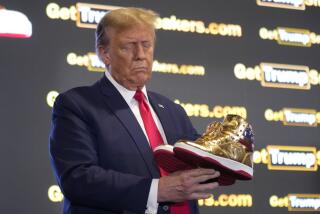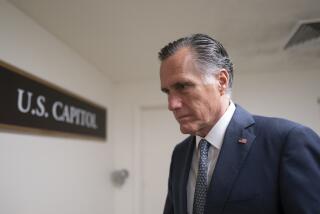Mitt Romney fumbles common touch regarding money
Reporting from Florence, S.C., and Columbia, S.C. — Mitt Romney has made his successful business career a centerpiece of his presidential campaign, saying his hands-on experience in corporate America is precisely what the country needs.
But when it comes to showing sensitivity to the economic anxiety many Americans are feeling, he has proven to have a less-than-deft touch.
A fresh example came Tuesday as Romney campaigned across South Carolina for the state’s Saturday primary and discussed his personal income and the possibility, under pressure, of releasing his 2011 tax return for public examination.
Listing his various sources of income, Romney mentioned the speakers’ fees he had earned in the run-up to his latest presidential bid. “Not very much,” he said.
A review of Romney’s latest financial disclosure forms shows he collected more than $374,000 in such fees during the year ending in February 2011 — more than seven times the income of the average American household.
Earlier in a conversation with reporters, Romney estimated that he paid close to 15% in federal taxes last year, a level well below that paid by many middle-class Americans and one that suggests that much of his income is taxed at the lower rates available to investors.
“Over the last 10 years,” he said, “my income comes overwhelmingly from investments made in the past.”
Candidates’ wealth and taxes have long been staples of political campaigns, especially when they come from well-to-do backgrounds. The most recent ultra-rich candidate — 2004 Democratic nominee John F. Kerry, married to an heir to the Heinz ketchup fortune — was routinely criticized as an out-of-touch elitist fond of habits, like windsurfing, not shared by the masses.
Romney has gone out of his way to demonstrate common-man tastes, like flying cut-rate airlines, staying at thrifty hotels and eating at sandwich joints. But displaying a common touch — a requisite for the comfortably off — is not always that easy, as he has repeatedly demonstrated.
The former Massachusetts governor joked with a group of unemployed Floridians about being jobless himself. He told voters in Iowa that corporations were people too. He threw out a seemingly casual $10,000 wager during one of the presidential debates. In a two-day span this month, he talked about living in fear of a pink slip and said he liked being able to fire people.
The latter was taken out of context from a larger discussion about demanding quality service. Even so, the episodes taken together present an image problem, said Dean Spiliotes, a longtime Romney-watcher.
“When people look at a president, they want to know: Does this person understand my life and what I’m facing?” said Spiliotes, a Southern New Hampshire University political science professor. “People want to know somebody can identify with them in their struggles.”
Republicans and Democrats alike seized Tuesday on the notion that Romney doesn’t.
The Obama administration suggested it would be only too happy to make Romney the face of its fight over tax inequality, a theme spurred by this year’s nationwide protests under the Occupy Wall Street banner. Spokesman Jay Carney, asked about Romney’s tax rate in a White House briefing, pointedly said Obama felt “very strongly that everybody needs to pay their fair share.” Obama paid 26% of his income in federal taxes, closer to the 35% maximum rate.
Carney also needled Romney by suggesting he follow the example of his father, George, who released his tax returns when he sought the White House in 1968.
“We think it’s a good tradition,” Carney said, noting that four years ago then-Sen. Barack Obama released “multiple years of his tax records” and has done so yearly since becoming president.
Other Democrats echoed the assault, releasing Web videos challenging Romney to release his returns and creating a Twitter hashtag, #WhatsMittHiding?
Even if the issue seemed like it would be more potent in the general election, Republican rivals who have been desperately seeking a toehold in South Carolina also fastened on the tax return issue as a way to raise suspicions and highlight Romney’s considerable wealth. (Romney reported assets of between $190 million and $250 million in financial disclosure forms last year.)
“Why is he hiding them?” former House Speaker Newt Gingrich demanded Tuesday.
Texas Gov. Rick Perry brought up the tax return issue during a contentious debate Monday night in Myrtle Beach, S.C. Perry said Romney needed to release his return “so the people of this country can see how you made your money” and decide whether “we’ve got a flawed candidate or not.”
Romney hedged in the debate, but on Tuesday in Florence noted that if he were the nominee, voters would want to see his most recent returns.
“So rather than sort of have multiple releases of tax returns, why, we’ll wait until the tax returns for the recent year are completed, and then release them,” Romney said.
Despite the criticism, Jim Dyke, a GOP consultant watching the presidential primary from the sidelines in Charleston, S.C., said it may not matter whether Romney struggles to forge a personal connection.
“Are voters looking for someone to feel their pain or fix the problem?” Dyke said. “If they want someone to feel their pain, then Obama will probably do well. If they feel we had a problem and he made it worse, than he’s probably in trouble regardless of how Romney’s defined.”
Times staff writers Michael Finnegan in Mount Pleasant, S.C., and Seema Mehta in Columbia, S.C., contributed to this report.
More to Read
Sign up for Essential California
The most important California stories and recommendations in your inbox every morning.
You may occasionally receive promotional content from the Los Angeles Times.












